- Home
- Robert Goddard
Panic Room
Panic Room Read online
ABOUT THE BOOK
High above a Cornish cove stands a vast, uninhabited, modern villa. Uninhabited except for Blake, a young woman of mysterious background, currently acting as house-sitter.
The house has a panic room. Cunningly concealed, steel-lined, impregnable – and apparently closed from within. Even Blake doesn’t know it’s there. She’s too busy being on the run from life, from a story she thinks she’s escaped.
But her remote existence is going to be threatened when people come looking for the house’s owner, missing rogue pharma entrepreneur Jack Harkness. Soon people with questionable motives will be asking Blake the sort of questions she can’t – or won’t – answer.
Will the panic room ever give up its secrets?
PANIC ROOM is Robert Goddard at his nerve-shredding best. A sliver of a mystery kicks off a juggernaut of a thriller. Layers of secrets, half-truths and deceptions must be peeled back to reveal what really lies within.
PANIC ROOM
Robert Goddard
Contents
Cover
About the Book
Title Page
Ten
Nine
Eight
Seven
Six
Five
Four
Three
Two
One
Zero
About the Author
Also by Robert Goddard
Copyright
TEN
I FEEL SAFE here. That’s really what it comes down to. Oh, there’s the sea as well. I like the ocean in all its moods, from stormy to still: white, grey, turquoise, blue. I can watch the surf crashing on the rocks for hours. On windless mornings, I can hear the skylarks circling above me as I walk down to the beach, my legs brushing through the drifts of wild mustard and cow parsley on the narrow path. And then there are the sunsets, pink and scarlet and gold, out beyond Wolf Rock, over the tilt of the world. Nothing here is like where I came from originally. I don’t want to leave, like I did there, all the time. I want to stay. Maybe for ever.
I can’t, of course. I don’t know how long it’ll go on. I try not to wonder. Harkness is in big trouble. He won’t have much chance to think about what’s going on here. He definitely won’t be helicoptering down for a visit any time soon. I’ve got the place to myself. That’s how I like it. Peaceful. Quiet. Alone. I swim. I walk. I run. I clean the place – just in case. I sell my driftwood art. I enjoy feeling safe.
Thanks to Harkness, I’ve got a lot of luxury to wallow in here. But the biggest luxury of all is the space. Glenys the gardener comes three days a week, Andy the pool man as often as he reckons he needs to. Otherwise, I don’t get many visitors. Nor does Harkness, which is a relief. I wondered, when his case hit the news, if the press would come poking around. But they didn’t. Maybe they don’t know about his Cornish bolthole. Here’s hoping they go on not knowing.
It might be best for Harkness as well as me if they did. I have a feeling this place is his biggest secret. And that’s saying something. ‘Notoriously secretive’, they call him. He’s not your obvious saviour material. But he’s been my saviour. I’m not sure what would’ve happened to me when Muriel chucked me out if I hadn’t been able to come here. Harkness doesn’t know that, of course – or anything much about me. I don’t suppose he gives me a single thought. Which is probably just as well.
We’ve got a good thing going, him and me, even if he doesn’t realize it.
It’s just a pity, one way or another, sooner or later, however hard I pretend otherwise, it’s going to end.
Don Challenor had never been one for recriminations, particularly where his own behaviour was concerned. He had inherited more of his father’s fecklessness than he would have cared to admit. But the key to living with the consequences was not to acknowledge responsibility for them. Accordingly, he interpreted the circumstances of his departure from Mendez Chinnery as a reflection on their narrow-mindedness rather than his corner-cutting. Estate agency, especially in the overheated central London market, was a dog-eat-dog world. The commission Mendez Chinnery paid him was not exactly over-generous. They should have expected him to take a few liberties and should certainly have been willing to overlook them in view of the amount of business he brought in.
But his boss – young, smug and idle by Don’s reckoning – saw things differently. So Don was out, casting around for another berth with age no longer on his side. Only his natural complacency prevented him worrying about what the future held. An opportunity would surely present itself. He had put the word out. He was keeping his ear to the ground.
It was a surprise, nonetheless, when the first contact he had after leaving Mendez Chinnery was not from one of their competitors but from a solicitor several of their clients used. Fran Revell also happened to be Don’s ex-wife, which might have caused a less self-confident man to doubt she wanted to do him a favour. But they had communicated cordially enough on business matters since their divorce. And Don for his part remembered their parting as more sorrowful than angry.
The fact that Fran had nominated a nearby coffee shop for their meeting, rather than her office, should perhaps have served as some form of warning. But Don chose to interpret that as her preference for a relaxed and informal environment, which was fine by him. He had even been tempted to suggest putting back their appointment by an hour and meeting in a bar. There were several in the vicinity he could recommend. Wisely, however, he had not pushed his luck. Pushing his luck, after all, was what had wrecked their marriage.
Fran was already there when he arrived, busy on her iPhone between sips of cappuccino. She looked, as ever, some years younger than her age, slim and groomed and glowing. As for her expression when she caught sight of him, well, there was no imagining away the tightness of her smile. But the half-affectionate, half-wary shake of her head suggested his goodwill account had not yet reached its overdraft limit.
‘You’re looking great, Fran,’ he said after an air-kiss greeting.
‘Thanks.’ She made no comment on his appearance.
‘I’ll grab a coffee. Then you can tell me all about it.’
‘This is just a bit of business, Don.’
‘Sure.’
He pondered her remark as he queued for his Americano, but not for long. There was nothing to be gained by trying to guess what Fran was thinking. There never had been.
He went back to her table with his coffee and sat down. The place was crowded with a predictable weekday haul of assorted professionals, killing time between appointments. Glancing around, Don found himself missing the rumbustious characters he had started out his working life with. Everyone now seemed bland by comparison. But the coffee was better. There was certainly no denying that.
‘How’s the family?’ he ventured, smiling across at Fran after trying to drink some of his coffee before realizing it was far too hot.
The ‘family’ Don referred to comprised the husband and two daughters Fran had acquired since their divorce. ‘They’re fine,’ she said briskly. Perhaps just a little too briskly, Don thought, who secretly hoped to hear one day that his replacement was being ditched in turn.
‘So, what can I do for you?’
‘You could start by explaining the “ethical differences” Ben said had led to you leaving Mendez Chinnery.’
‘I should’ve got out of there yonks ago. How can I be expected to do my best work when I have to answer to a prat like him?’
Fran closed her eyes for a second. ‘Maybe this was a mistake.’
‘Look … Ben and I had a major falling-out. That’s all there is to it.’ Don shrugged. ‘I’d probably have resigned anyway. It was time to move on.’
‘Where to?’
‘Not sure yet.’
/> ‘No.’ Fran sighed. ‘Exactly.’
‘Well, if you know of a juicy opening …’
‘I don’t. But, as it happens, I do have an urgent job that needs doing and, since you’re available at short notice …’
‘Good of you to think of me, Fran.’
‘Yes. I can’t seem to stop myself doing that.’ She frowned away the hint of affection. ‘Occasionally.’
He grinned. ‘So what’s the job?’
‘I’ve been handling a divorce for a woman who wants to sell a property ASAP. It’s in Cornwall and she’s anxious to proceed quickly. I need a valuation, floor plans, photographs, et cetera, to present to suitable agents. We’re talking about a price tag of five million or so – the international market.’
‘I wouldn’t mind having a crack at selling it myself.’ Don was hardly exaggerating. A £5 million property could net him more than a hundred thousand. ‘I could put several buyers her way.’
‘We’ll see. For the moment, I just need you to go down there and put the particulars together.’
‘She doesn’t want this dragged into the divorce settlement. Is that it?’
‘She owns the place outright, Don.’ Fran looked reprovingly at him. ‘And the divorce is done and dusted. She has an unfettered right to sell. I’m simply making the arrangements on her behalf while she spends some time abroad.’
‘Of course, of course. I don’t know what came over me.’
‘Can you do it?’
‘Sure. Subject to … an agreement over terms.’
‘Two thousand. Plus accommodation and travel. On condition I have all the details by the start of next week.’
‘That’s tight.’
‘That’s why it’s also generous. And I’m guessing you won’t find it too difficult to clear your diary.’ Fran smiled. ‘Do we have a deal?’
‘Why not? It’ll be a nice run for the car.’
‘Don’t tell me you still have the MG.’
‘She’s a classic. Like me.’
Fran did not rise to the remark. She drained her cappuccino, plucked a couple of sheets of paper out of her briefcase and laid them on the table in front of him. ‘Sign on the dotted line, please. Both copies. It’s our standard contract for freelancers.’
‘Do we really need a contract?’
‘I’m a lawyer, Don. Remember how much I saved you on our divorce?’ Don managed a crumpled smile at what sounded to him like a considerable misrepresentation and cast his eye over the document. Fran thumbed away at her iPhone until he had signed.
‘I’ve just emailed details of the property’s location. It’s on the Lizard peninsula, near Mullion. Wortalleth West. The client’s name is Jackson. Mona Jackson. There was a live-in housekeeper, but she left a couple of months back. Her part-time assistant’s been looking after the place since then. There’s also a part-time gardener. You might run into them. Otherwise, it’s all yours.’ She plonked a bunch of keys on the table. Tied to the ring was a label bearing the printed initials FR/MH – some kind of filing reference at Fran’s firm. Don pocketed the keys and Fran retrieved her copy of the contract.
‘I should be getting back to the office,’ she said briskly. ‘I think we’re done here, aren’t we?’
‘Yes.’ Don nodded compliantly. ‘And I can always phone you if something crops up.’
Fran frowned. ‘I can’t see why it should.’
‘No, well …’ Don shrugged. ‘Thanks again, Fran.’
‘You’re welcome.’
Don stayed on to finish his coffee after Fran left. He paid no attention to a heavily built, bearded man nursing a minute espresso cup in the corner. The man had a vaguely Slavic appearance, though he was reading, or at any rate turning the pages of, an Italian newspaper. He did not seem to pay Don any attention either. But, when Don rose and left, he suddenly found it necessary to rise and leave as well. In a rustle of newspaper-folding and a scraping of chair legs, he was up and on his way.
Which happened to be the same way, though at a discreet distance, as Don was going, west along Piccadilly, towards Green Park station and a Tube ride home.
There was, though Don did not know it yet, something else he had Fran to thank for. He had just become a marked man.
I went down to the cove early this morning to look for driftwood. There wasn’t much. The weather hasn’t been right. You need storms really. But I’m not complaining. The sea was a millpond, the air pure, the light clear. The tide was on the turn. I took off my shoes and let the water rush in around my feet. The sun was already warm on my back. And there was a fizzing sensation between my toes as the bubbles in the surf started to burst. I looked out at the ocean and saw what I always see, reflected in its shimmering vastness: peace – and freedom.
I was close to the rocks, where the Bonython stream comes out. The only sound was the sea. There weren’t even any gulls screeching. I don’t know what made me look up to the top of the cliff. But I knew I’d see something – or someone – if I did.
It was Wynsum Fry, squat and swaddled in a shapeless coat, the sunlight turning her grey mop of hair into a smudge of white. She’s got no car, so how did she get there? The first bus out of Helston goes straight to Lizard village. She couldn’t have walked all the way from the main road. But there she was. Watching me watching her.
Then she wasn’t. I suppose she simply stepped back out of sight. But it was more like she just … blinked out. The old bitch has her tricks. If that’s all they are. I wish she’d stay away. But she won’t.
I hurried back up the beach and walked round the shore road to the lane that heads up towards the top of the cliff. There was no sign of her, of course. I knew there wouldn’t be. She moves like a tortoise most of the time. And then, at other times …
Maybe it wasn’t me she was looking at, but the rock pools she could see from where she was standing. Which one was it her brother drowned in? Could she be sure, all these years later? Maybe the rocks move slowly over time anyway, shifted by storms and tides, and the pools with them, so the actual one isn’t there any more. Nothing’s really fixed. Nothing’s really absolute.
When I got back here, I found a king of spades playing card fixed to the pillar of the entrance gate with a rusty pin. It’s her mark. She calls Harkness the King of Spades. But why the card? Why now?
I pulled the pin out and the card fluttered to the ground. I didn’t pick it up. I left it lying there, face down. The pattern on the back was some kind of geometrical labyrinth. Did she choose it specially, I wonder?
I’ve just been back down to the gate. The card’s gone. I hope she’s gone too.
Whatever anyone said – and what they usually said was that his insistence on driving a gas-guzzling relic from another age was both environmentally irresponsible and a transparent as well as ultimately futile attempt to recapture his lost youth – Don had no intention of trading in his 1973 MGB GT V8 for a younger or more economical model. The smell of the leather and the rumble of the engine were as familiar to him now as when he had first travelled in the car as a child, with his father at the wheel. The drive west out of London that morning in early June had, like all his drives, nothing to do with cost or comfort or convenience. It was about cleaving to what he knew and loved.
The M3, A303 and A30 formed his long route to the far south-west. The trees were heavy with summer foliage, the fields richly green in the misty light. From Salisbury Plain onwards, the sky was blue, the day open and dazzling. Through his sunglasses the world appeared golden and inviting. On the open road, reality lost its bite.
At Exeter Services, he stopped for a Coke and a sandwich. He was making good time. He was grateful to Fran, not just for the money he would earn from the trip but for the break from London she had prompted him to take. Leaving the city was like having a weight lifted from his shoulders. He really should have left Mendez Chinnery sooner. Perhaps he could turn himself into a tweed-suited purveyor of farmhouses and cottages in a provincial setting. It was not too late
to change. It was never too late.
‘But don’t worry, old girl,’ he said, patting the tailgate of the car, which he had raised to create a draught while he was parked. ‘I’ll never trade you in for one of those.’ By ‘one of those’ Don meant the black, dusty, mirror-windowed off-roader that had pulled in a few bays away. He hated all four-by-fours on principle.
Don pressed on, through the emptiness of mid-Devon, across Bodmin Moor and down the spine of Cornwall towards his destination. He was confident of arriving in time to spend most of the afternoon at the house. He had booked a room at a hotel in Helston. It looked like one night would be enough. The task itself was simple. He had done it a thousand times.
From the outskirts of Helston, he headed true south for the first time, past the long perimeter of RNAS Culdrose and down the road towards Lizard Point. The countryside varied between farmland and moor. The soft and prosperous Home Counties were far behind him.
He turned off the road at the sign for Mullion and drove into the village, following the narrow one-way route round the tightclustered centre. He found a car park near the church and walked back to the shops to buy a large-scale OS map of the area and the local weekly newspaper. He and the MG naturally had no time for satnavs and he was confident the house would be identifiable on the map. The paper meanwhile would add to what he had already discovered on assorted websites about property prices in the locality, although he anticipated Wortalleth West might be in a price bracket all of its own.
As he exited the shop, another of the four-wheel-drive behemoths he loathed cruised slowly by. It was black, with reflective windows, like the one he had seen at Exeter Services. ‘Unsightly bloody monsters,’ he muttered to himself as he turned in the direction of the car park.
The map, studied in conjunction with Fran’s emailed directions, put Wortalleth West away to the north of the village, above Poldhu Cove, accessed by a lane off the minor road that led to the cove before curving inland. As for the newspaper, there were a couple of choice properties on the Helford estuary with price tags of two or three million, but nothing approaching the five Fran had spoken of. Wortalleth West would have to be quite something to justify that.

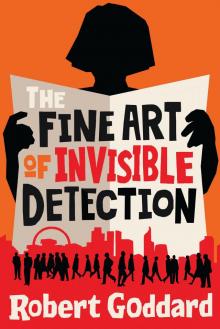 The Fine Art of Invisible Detection
The Fine Art of Invisible Detection One False Move
One False Move Panic Room
Panic Room Beyond Recall
Beyond Recall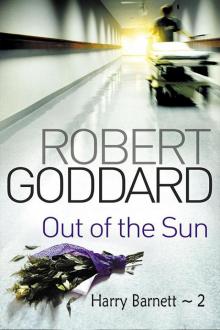 Out of the Sun
Out of the Sun In Pale Battalions - Retail
In Pale Battalions - Retail Painting The Darkness - Retail
Painting The Darkness - Retail The Corners of the Globe
The Corners of the Globe Name To a Face
Name To a Face Closed Circle
Closed Circle Caught In the Light
Caught In the Light Into the Blue
Into the Blue Past Caring - Retail
Past Caring - Retail Past Caring
Past Caring Hand In Glove - Retail
Hand In Glove - Retail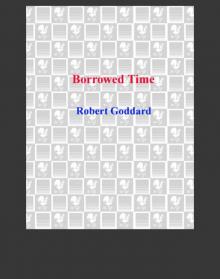 Borrowed Time
Borrowed Time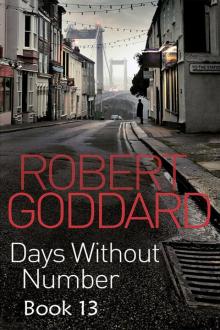 Days Without Number
Days Without Number James Maxted 03 The Ends of the Earth
James Maxted 03 The Ends of the Earth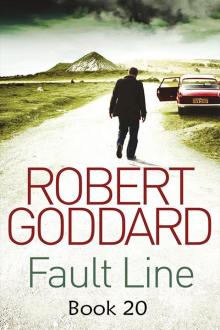 Fault Line - Retail
Fault Line - Retail Play to the End
Play to the End Sea Change
Sea Change Never Go Back
Never Go Back Take No Farewell - Retail
Take No Farewell - Retail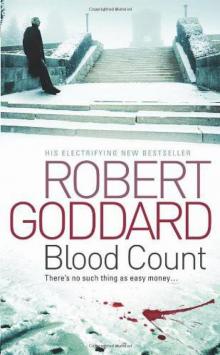 Blood Count
Blood Count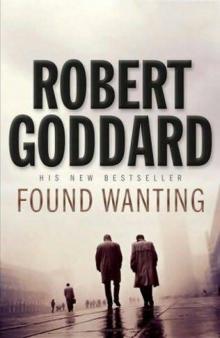 Found Wanting
Found Wanting Sight Unseen
Sight Unseen Hand in Glove
Hand in Glove The Ways of the World
The Ways of the World